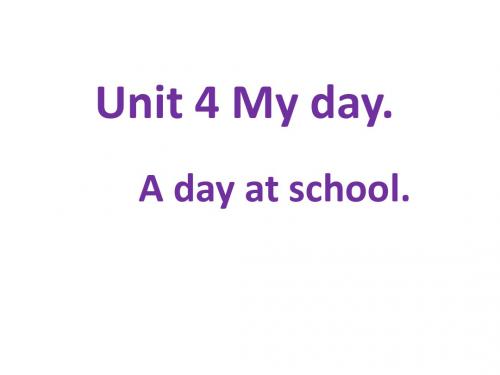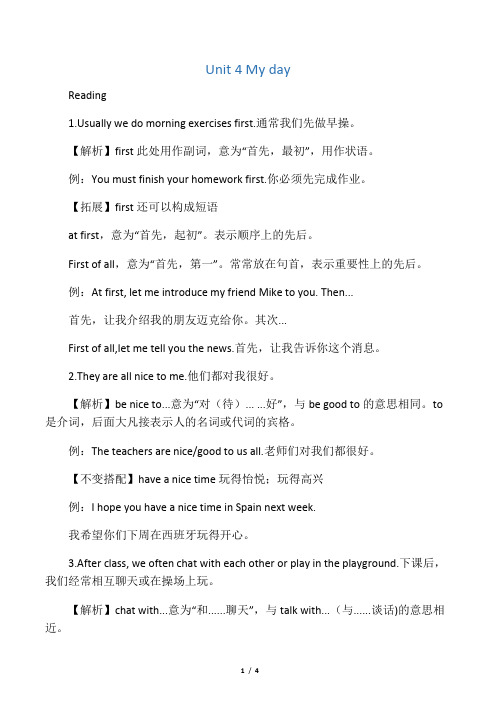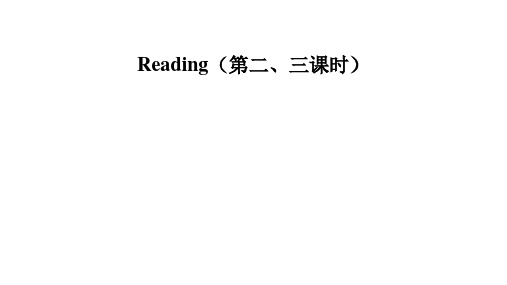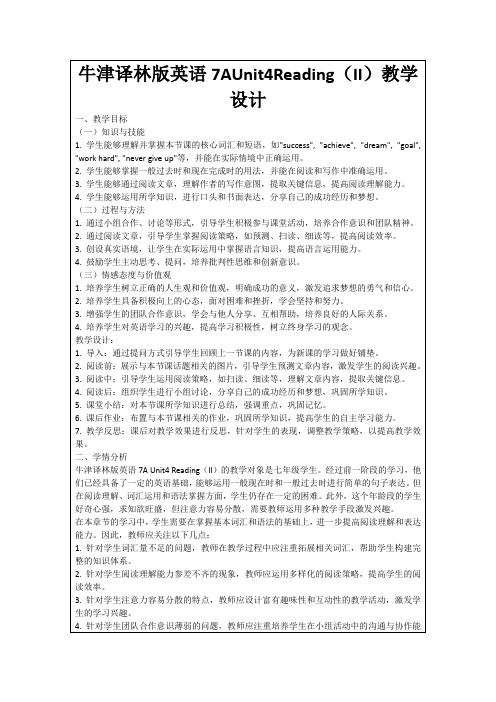译林版七年级上册7a unit4 reading
牛津译林英语七年级上册Unit4reading (共40张PPT)

What time is it? It’s eight fifteen.
It’s fifteen pass eight.
What time is it? It’s eleven fifty.
It’s ten to twelve.
What time is it? It’s one thirty.
Homework:
Tell your partners about your day.
What time do you have lunch?
I have lunch at 11:50.
At ten to twelve.
What time do you do after-school activities
At 4:00.
What time do you go home?
I go home at 4:30. At half pass four.
Aunt: Millie, when do you go to school every day?
Millie: I usually go to school at 7:20. I’m never late for it.
Aunt: Good. What time do you start lessons? Millie: At a quarter pass eight. Aunt: Do you enjoy school, Millie? Millie: Yes, I enjoy it very much.
Unit 4 My day.
A day at school.
教学目标:
• 介绍日常学习和生活的基本安排和活动。 • 对自己或他人的一天进行简单描述。
牛津译林初中七年级上册英语 Unit 4 My day Reading课件 (2)

▪ A.sing B.to sing C.singing D.sings
▪ lie is very nice __D___ her classmates and they all like her.
▪ A.of
B.from C.for D.to
Step 2 .
1. first adv. adj.
My classroom is on the _f_i_r_s_t_(one) floor. You should do your homework__B__before(在…之前)
you watch TV. A. one B. first C. then Sunday is the _f_i_rs_t_ (one) day of a week. Safety(安全) comes _f_ir_s_t_(one). ▪ wish n. wishes Teachers’ Day is coming, here’s a flower for you
• each other ---互相
• we often help _e_a_c_h___ o_t_h_e_r___.
• We 。should learn f_r_o_m__ e_a_c_h___oth__e_r____.
2. We practise after school on Wednesday afternoon.
school.
Describe what your ideal
school is like.
When
start lessons
go home
What
after class after school
What they are like teachers
苏教版七年级上册译林版7A全册单词表

英语 oh e-dog master grade student reading classmate after school slim be good at over classroom dancing swimming age looks cute hobby glad everyone come from glasses 7A(unit 2) walking really bowl time tennis volleyball enjoy go swimming player member club 中文
面具,面罩 用颜料涂 南瓜 灯笼,提灯 当……的时候 在(或向)里面 敲,击 敲门 大声说,叫,嚷 不招待,就使坏 如果 招待 诡计,把戏 特殊的,特别的 问题 汤团,饺子 粽子 祖父(母) 另外,其他 东西,物品 狮子 狮子舞 烟花,烟火 发现 更多(的) 无线电广播(节目),收 音机 拍照 在夜里 演出,秀 好像,似乎,看来 不同的 围绕,在…周围 重要的 大多数,大部分
词组it 3 Unit 4
7A 7A 7A 7A 7A 7A 7A 7A 7A 7A 7A 7A 7A 7A 7A 7A 7A 7A 7A 7A 7A 7A 7A 7A 7A 7A 7A 7A 7A 7A 7A 7A 7A
vi/vt 词组 v n adv. adv. 词组 词组 vt. n. adv. 词组 词组 adj. n. n. 词组 adv. adv. 词组 vi/vt n. prep. 词组 adv. vi. det/pron pron pron
7A 7A 7A 7A 7A 7A 7A 7A 7A 7A 7A 7A 7A 7A 7A 7A 7A 7A 7A
vi/vt n. vi/vt 词组 prep. n. n. n. conj. n. adv. 词组 n. adj. abbr.
七年级上册英语Unit 4 My day Reading知识点梳理-译林版

Unit 4 My dayReadingually we do morning exercises first.通常我们先做早操。
【解析】first此处用作副词,意为“首先,最初”,用作状语。
例:You must finish your homework first.你必须先完成作业。
【拓展】first还可以构成短语at first,意为“首先,起初”。
表示顺序上的先后。
First of all,意为“首先,第一”。
常常放在句首,表示重要性上的先后。
例:At first, let me introduce my friend Mike to you. Then...首先,让我介绍我的朋友迈克给你。
其次...First of all,let me tell you the news.首先,让我告诉你这个消息。
2.They are all nice to me.他们都对我很好。
【解析】be nice to...意为“对(待)... ...好”,与be good to的意思相同。
to 是介词,后面大凡接表示人的名词或代词的宾格。
例:The teachers are nice/good to us all.老师们对我们都很好。
【不变搭配】have a nice time玩得怡悦;玩得高兴例:I hope you have a nice time in Spain next week.我希望你们下周在西班牙玩得开心。
3.After class, we often chat with each other or play in the playground.下课后,我们经常相互聊天或在操场上玩。
【解析】chat with...意为“和......聊天”,与talk with...(与......谈话)的意思相近。
例:Do you often chat with your friends?你经常和你的朋友们聊天吗?【解析】each other相当于代词,表示相互关系,意为“互相,彼此”。
Unit4Reading课件牛津译林版英语七年级上册

B.When; begins
C.How long; begin
知识概要
课时讲练
知识清单
11
7.—Excuse me! Where’s the music room, sir
—________. On the second floor.( )C
A.Pardon
B.Sorry, I don’t know
4.These foreigners(外国人) are practising________ Chinese.( B )
A.to speak
B.speaking
C.speak
[解析] practise doing sth意为“练习做某事”,是固定搭配。
知识概要
课时讲练
知识清单
10
5.Tom________ playing table tennis with his friends after school.( B )
A.too likes
B.also likes
C.likes also
[解析] also用于句中,通常放在be动词之后,行为动词之前。too和
either均用于句末。
6.—________ does his school ________
—At eight o’clock.( A)
A.When; begin
知识概要
课时讲练
知识清单
3
3.After class, we often chat with each other or play in the playground. 下课后,我们经常彼此闲聊或在操场上玩。
(1) chat with意为“与……聊天”,与talk with意思相近。例如: Do you often chat with your parents? 你经常和你的父母亲聊天 吗? (2) each other是代词,意为“互相,彼此”,表示相互关系,强 调两者之间的“互相,彼此”。它通常放在动词或介词后作宾语。例如: We look after each other. 我们互相照顾。 (3)in the playground意为“在操场上”,是英式英语里的表达法, 美式英语里常用on the playground。
unit 4 comic-reading讲解 牛津译林版英语七年级上册

授课标题7A Unit 4 Comic--Reading 新课讲解学习目标 1.掌握本单元四会短语和单词;2.能用相应的交际用语进行日常交流3.掌握并学会运用表示时间的介词;频度副词重点难点 1.介绍自己在学校一天的情况2.掌握并学会运用与时间相关的介词以及与频度相关的副词知识讲解与练习一、Comic strip1.wake up醒来,唤醒(注意:当wake up接代词作宾语时,代词要放在中间)I’m so tired.Don’t wake me up,Mum.I don’t w ant to wake you up.awake 醒着的,adjI was still awake at four o’clock in the morning.2.Is it time for breakfast?到早饭的时间了吗?It’s time for sth …是…的时候了。
大多数情况可以转换为It’s time to do sth.It’s time for lunch=It’s time to have lunch.It’s time for me to go to scho ol.3.Shall we go walking in the hills?我们去山上散步好吗?Shall we +V(原形)? 表示提出建议。
表示建议的句型有:why not +doWhy don’t you+doWhat about/how about +doingHow about going to the park?hill n. 小山,词组:in the hill.在山上4. know how to have fun.知道如何享乐该词组是由“特殊疑问词+不定式to d o”构成的不定式短语,用作动词know的宾语。
Do you know how to make a kite?Please tell me when to leave.have fun/enjoy oneself/have a good time doing sth 做某事玩的开心,过得愉快fun为不可数名词We have fun playing basketball every weekend.知识巩固训练:1.We can’t work out the physics problem.Ca n you tell us ?A.how to doB.what to do itC.how to do itD.what should to do2.It’s time the weather report .Turn on the radio,please.A.toB.in C at D.for3.They have fun (swim)in the lake.4.I t’s time to go to school.(同义句转换)5.Kate always has a good time with her family.(同义句转换)Kate always with her family.二、Welcome to the unit1.do morning exercises 做早操exercises 是可数名词,意为“操练,练习”,常用复数形式。
牛津译林英语七年级上册Unit4reading (共23张PPT)

have a good time... love my school…
Discussion
1.What's the differences between our school and theirs ? 2.What do you think of their school life ? 3.What should we do ?
in the afternoon do after-school activities
play volleyball
practise 练习,训练
/ 'p r æ k t I S/
wish祝愿 / w Iʃ / go to the Reading Club
have a good time
Listen and answer
Judge T or F .
lie's school starts at
8:1050 .
F
2.Her favourite subject is
English.
T
Can you help me ?
Millie goes to the l_ib__ra_r_y__in the afternoon . She goes to the Reading Club on T_u_e_s_d_a_y_ and T_h_u_r_s_d_a_y_.
Group work: Can you talk about your school life
I’m a student at…
Student1 School and lessons
start / begin at…
Student2 Friends at school
牛津译林版英语7AUnit4Reading(II)教学设计

1.针对学生词汇量不足的问题,教师在教学过程中应注重拓展相关词汇,帮助学生构建完整的知识体系。
2.针对学生阅读理解能力参差不齐的现象,教师应运用多样化的阅读策略,提高学生的阅读效率。
3.针对学生注意力容易分散的特点,教师应设计富有趣味性和互动性的教学活动,激发学生的学习兴趣。
3.学生能够通过阅读文章,理解作者的写作意图,提取关键信息,提高阅读理解能力。
4.学生能够运用所学知识,进行口头和书面表达,分享自己的成功经历和梦想。
(二)过程与方法
1.通过小组合作、讨论等形式,引导学生积极参与课堂活动,培养合作意识和团队精神。
2.通过阅读文章,引导学生掌握阅读策略,如预测、扫读、细读等,提高阅读效率。
五、作业布置
为了巩固本章节的学习内容,确保学生对核心知识点的掌握,特布置以下作业:
1.写作练习:请学生撰写一篇关于自己梦想的短文,要求运用本节课学习的词汇和语法,如"success", "achieve", "dream", "goal", "work hard", "never give up"以及一般过去时和现在完成时。通过写作,让学生将理论知识与个人经历相结合,提高语言运用能力。
2. Can you share a successful experience of your own?
3. What is your dream and how do you plan to achieve it?
这些问题将自然引出本节课的主题,为学生接下来的学习做好情感上的准备。
- 1、下载文档前请自行甄别文档内容的完整性,平台不提供额外的编辑、内容补充、找答案等附加服务。
- 2、"仅部分预览"的文档,不可在线预览部分如存在完整性等问题,可反馈申请退款(可完整预览的文档不适用该条件!)。
- 3、如文档侵犯您的权益,请联系客服反馈,我们会尽快为您处理(人工客服工作时间:9:00-18:30)。
next
What’s the name of Millie’s new school?
What do they often do after class? Does Millie have a lot of friends? Which team is Millie in?
What subject does Millie like? When do their lessons begin?
reading
zhaipuli
教学目标:
1.Master the new words:first /chat /each other/ practice /have a good time/ wish Sunday 星期日 Monday 星期一 Tuesday 星期二 Wednesday 星期三 Thursday 星期四 Friday 星期五 Saturday 星期六 2.Read and understand the article.then recite it.
Para.2 Para.3
Para.4
Read the text paragraph by paragraph. answer the following questions.
Does Millie like her school very much?
Yes, she does..
lie’s favourite subject is ________ .
volleyball
Skill 3:Careful t is the main idea of each paragraph?
Para.1
Millie’s school activities. Millie’s friends. Millie’s and her friends’ afterschool activities. Millie’s school .
Homework:
1. Read the text and try to recite it. 2. Talk about your school life in English with your classmates.
Read Paragraph 4 and complete the following text. Millie goes to the school l_________ every day. She goes to the Reading C_________ every T____________ and T___________. She also likes playing v______________. Millie is a m_____________ of the school volleyball team. She p______ after school on Wednesday afternoon,
Skill 2:Scanning(索读)
淡化其他语句,
寻找某个特定信息。
Read carefully.Tommy is telling his friends about Millie’s e-mail. T/ F.
Millie likes her school very much. T School starts at 8:15 every morning. F 8:00 English is Millie’s favourite subject. T Millie seldom chats with her friends after class. often F • Millie only goes to the Reading Club on F Tuesday. and Thursday • Millie is a member of the Swimming team. F • • • •
复述reading
Dear Tommy, Now I am…I … Our school …Usually we… Our lessons… My favourite…I… I have…They…After class, We … Sometimes my friends …we have…We often…I also …I am in…We … We always… Best wishes Millie
Do they enjoy their school life ?
When does Millie practise playing volleyball?
When does she go to the Reading Club?
词组练习
• • • • • • • 1在早上 in the morning 3在星期二 on Tuesday 4我最喜欢的科目 my favourite subject 5做早操 do morning exercises 6擅长 be good at = do well in 7互相聊天 chat with each other 8玩得高兴 have a good time
2.They do _______first.
1. What do they often do after class? They often chat with each other or play in the playground. 2. How’re all her friends? They are all nice.
Skill 1:Skimming(略读)
快速浏览全文,粗略地了 解文章大意。
While-Reading: Fast reading
What is the e-mail about?
A Millie’s family C Millie’s class B Millie’s everyday life D Millie’s school life
